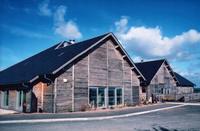Ecologically Sustainable Construction
Energy Efficient and Ecologically Sustainable Buildings
It has now been established that climate changes are occurring throughout the world. It is also apparent that these changes are being driven by the actions of the human race and that the delicate balance of this planet’s atmosphere has been drastically altered. This is particularly illustrated by the rapid rise in the percentage of carbon dioxide, largely due to the burning of fossil fuels to provide our energy needs. To avoid irrevocable damage to our planet, we must reverse these trends. A large proportion of energy is used in heating the space within buildings. The consumption of energy sources that produce carbon dioxide must be reduced by finding alternative non-polluting sources of energy and diminishing the amount of energy required by reducing the loss of heat through the fabric of the building.
A large amount of energy is also consumed in the construction of buildings, both in the production materials and in transporting them to the construction site. For example, it requires a vast quantity of energy to turn limestone into cement and extract ferrous products from iron ore. The use of such energy-hungry materials needs to be reduced or eliminated as far as possible if we are to achieve ecologically sound building construction. The use of harmful chemicals should also be avoided in construction. There are many products that are generally harmful to the environment and to the occupants and users of buildings once they are in place. The use of many of the products of the petrochemical industry should be used sparingly and preservatives such as CCA (copper chrome arsenic) timber treatment should be kept to a minimum. The list is too long for a detailed analysis but these elements need to be kept in mind when designing and constructing buildings which are to have a minimum impact on their environment as well as those who use them.
This Practice is well placed to provide structural engineering services for building projects where reducing the environmental impact of their construction is important. Not only are we keen to see buildings constructed which minimise the impact on the environment as a whole but we hold valuable experience in designing with the materials and building forms best suited to ecologically sound construction.
We are experienced in designing with timber, a material which not only requires little energy to produce but also the growing of trees takes carbon dioxide out of the atmosphere and retains it. In environmental terms, this scores double-points and its use should be encouraged, not only in conventional sawn form but also in its other forms such as round log construction through to more technically innovative uses and engineered timber products such as glulam, I-beams, laminated veneer lumber, oriented strand board etc. Our experience in designing structures in these materials gives us the ability to seek out the more environmentally friendly solutions. The use of timber species that are grown in this country can also further reduce the carbon footprint of its transport from its source.
If we are to achieve a substantial reduction in the impact of the environment with our buildings, our current methods of construction must be examined and alternatives appraised. Integrating the structure with the other needs of the building, such as thermal insulation, heat recycling, ventilation control, are all important aspects of this overall objective. The more options we have, the better able we will be to achieve them. The thermal performance of buildings, as set by Part L of the Building Regulations, is continuing to be racheted up. This is part of the Government's aim to make all new buildings 'zero carbon'. Consequently, the need for ecologically sound construction will become not only desirable but a necessity by law.
This Practice has been involved with the design of energy efficient and ecologically sustainable buildings and aims to provide designs which allow for the long-term economic factors as well as the short term building costs. The conservation of heat and energy is an increasingly important element of building design and must be taken into account at the design stage. The use of ecologically sound materials is also promoted and our expertise in timber, the only truly renewable material, assists us in this endeavour. We welcome the opportunity to work on designs where the wider ecological implications of a building are taken into consideration. We have also provided the engineering design for many new cob or earth buildings. This is a material with minimal energy input while providing plenty of thermal mass which is an important factor for the balancing of the thermal performance of a building.

